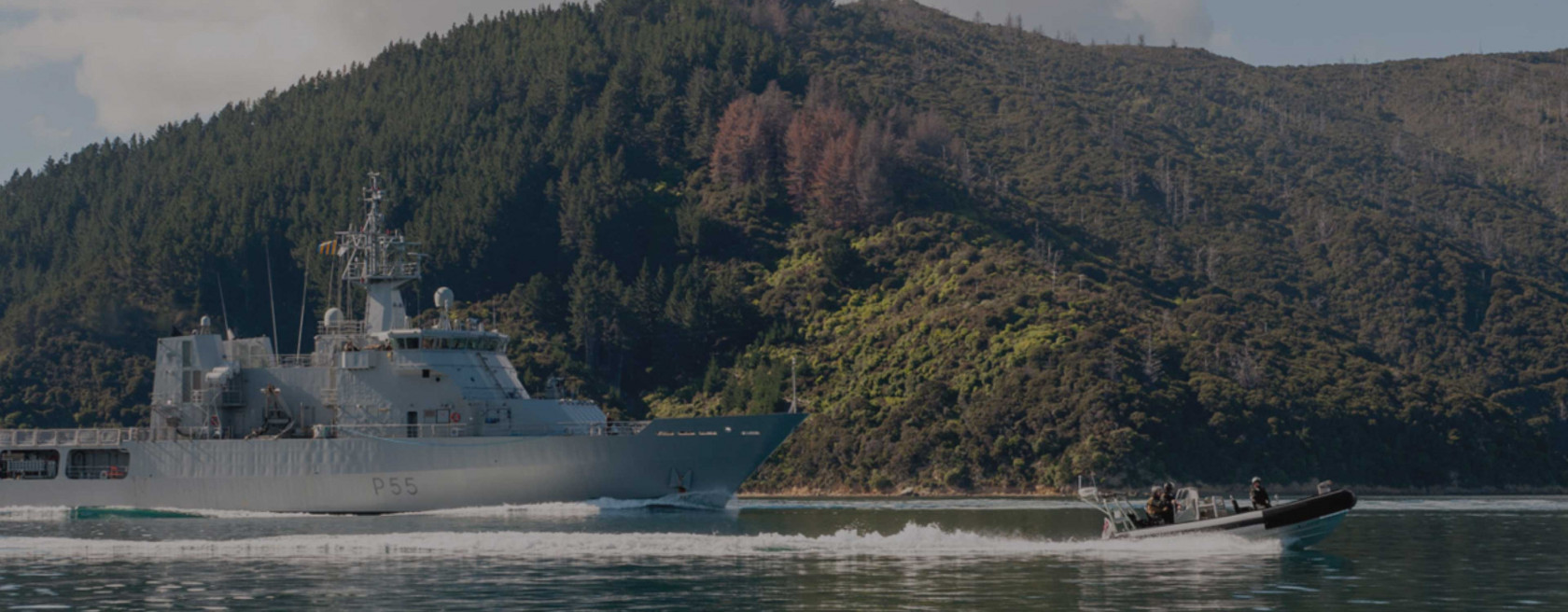Reserve Psychologist
Skip to section:
About the role Career progression and training Salary and benefits Entry requirementsA psychology career unlike any other, based ashore, at sea and even overseas. You will have the opportunity to experience a number of areas within organisational and military psychology.
- ServiceNavy
- SpecialisationNaval Reserve
- LocationAuckland, Tauranga, Wellington, Christchurch, Dunedin
-
Initial daily rate$224
About the role
As a Psychologist, your role in the RNZN is broad and varied. Navy Psychologists are regularly involved in challenging professional tasks within the New Zealand Defence Force that require psychological knowledge and expertise.
You need to have a Master’s Degree in Psychology before applying, be registered with the New Zealand Psychologists Board and be a member of the New Zealand Psychological Society.
If you have referred to the minimum requirements below but would like more information on this role please email specialists@defencecareers.mil.nz
Job on base
Your role is demanding yet fulfilling and provides exposure to a number of areas within the disciplines of organisational and military psychology. Navy Psychologists are regularly involved in challenging professional tasks within the New Zealand Defence Force that require psychological knowledge and expertise.
Job on deployment
Another significant area of work involves support to operations. As an RNZN Psychologist, you may have the opportunity to provide support to crew onboard a ship at sea. You will also be part of a wider team of NZDF psychologists. All NZDF psychologists are involved in providing education and support to individuals and formations heading overseas on deployments, as well as providing support and screening for those returning from missions. From time to time, this work occurs outside New Zealand, so you may be called upon to serve overseas temporarily.
Career progression and training
Training Overview
Time Commitment
Basic Training - JOCT
Job Training - Psychologist
Career Progression
During your first 11 months in the Navy, you will be taught core military, mariner and leadership skills.
Basic Training – Junior Officer Common Training: This initial training is known as Junior Officer Common Training (JOCT) and begins with nine days at Devonport Naval Base and the Tamaki Leadership Centre in Whangaparaoa.
Job Training: Training as a Reserve Psychologist is developed case-by-case in consultation with the Head of Navy Psychology.
Ongoing Career Progression: Following successful completion of JOCT, you will typically be promoted to Sub-Lieutenant and begin familiarisation with the Operational Psychology Department at Devonport Naval Base. As your career progresses, your hard work, experience and training accomplishments as a Psychologist are rewarded by promotions in rank and salary.
Course dates will be advised by your Candidate Engagement Facilitator as part of your recruitment journey.
Reservists who have not previously served in the Regular Force (ab initio Reservists) commit to a minimum cumulative total of 20 days’ service each year for professional development and operational delivery. This is made up of a minimum of 14 days of full-time training, exercises, operational activity and/or supplementation to the Regular Force plus weeknight and weekend training. An additional 20 days is available for supplementary activities that benefit both individual Reservists and the NZDF.
Weekend training may also include Friday evenings. Longer exercises are conducted over periods ranging from four to 14 days.
Naval Reservists receive an hourly rate of pay, up to a maximum of eight hours per day, commensurate with their rank and experience. This also encompasses travel time required to attend training.
During your first 11 months in the Navy, you will be taught core military, mariner and leadership skills in order to be an effective officer in the Navy. This initial training is known as Junior Officer Common Training (JOCT) and begins with nine days at Devonport Naval Base and the Tamaki Leadership Centre in Whangaparaoa.
JOCT continues once you return to your home unit, with weekend training once a month, one evening of training each week, and self-study. You will also complete another week of full-time training in August and again in November, focusing on leadership skills.
Reserve officers receive the same initial training as their Regular Force counterparts. This includes parade training (drill), an introduction to the laws of armed conflict, first aid, naval customs and ceremonies, communications, an introduction to damage control, and small arms.
Upon the successful completion of JOCT, you will typically be promoted from Midshipman to Sub-Lieutenant and begin your familiarisation with the Operational Psychology Department.
After completing Junior Officer Common Training you will undergo a programme of induction training with the Organisational Psychology Department. This will involve meeting all the relevant personnel and introducing you to the variety of roles that are undertaken by psychologists.
Over time, you will consolidate your experience and skills learnt within the Organisational Psychology Department and will become eligible to go to sea or overseas, to provide deployment related support. You may also have the opportunity to get involved in joint activities and projects with the wider Defence Force, including with Defence Force Headquarters and Headquarters Joint Forces New Zealand.
Psychologists are also encouraged to undertake additional NZDF courses to enhance their general Service and military skills, and therefore their deployability.
Following successful completion of Junior Officer Common Training, you will typically be promoted to Sub-Lieutenant and begin your familiarisation with the Organisational Psychology Department at Devonport Naval Base.
It is a requirement for all promotions that you be medically and physically fit. You will be eligible for promotion to Lieutenant once you have obtained three years of seniority as a Sub-Lieutenant, have your Commanding Officer’s recommendation, and have completed three courses alongside your Regular Force counterparts: the Lead Leaders course (five days), the Divisional Management Course (two weeks), and the Incident Managers Damage Control course (five days).
Promotion to Lieutenant Commander and above is based on merit. Promotion to Lieutenant Commander requires the completion of the Intermediate Command and Staff Course (Joint) or an equivalent international course. Promotion to Lieutenant Commander is also subject to minimum lengths of service and seniority in rank.

Salary and benefits
As a Reservist you are paid on an hourly rate rather than a salary. Pay rates depend on the role you are in and your rank; your pay will increase as you move up through the ranks.
As a Reserve Psychologist, the minimum remuneration you will be paid from day one is a daily rate of $223.72 plus an allowance for holiday pay. You are paid for each hour you work, up to a maximum of eight hours’ pay per day. Your remuneration will continue to increase on promotion and with the gaining of seniority.
$224
Initial daily rate
WATCH | How our Psychologists help enhance the performance of individuals and teams across the NZDF.
Entry requirements
Basics
Education
Fitness and Medical
Citizenship
- Hold a Master’s Degree in Psychology. See education tab for more details;
- Hold a current practising certificate in the “Psychologist” or “Clinical Psychologist” scope of practice;
- Be a member of the New Zealand Psychological Society;
- Be free of any criminal convictions for the previous two years;
- Pass an Officer Selection Board.
- Hold a Master’s Degree in Psychology, preferably with an industrial/organisational focus or a clinical focus.
- Have at least two years of relevant, post-qualification experience.
- You must be medically fit for service.
- You must meet the minimum entry fitness standards.
- Colour perception restrictions may apply.
There are strict citizenship and security requirements to gain the SV security clearance required for this trade. You must be free of any criminal convictions for the previous two years.

